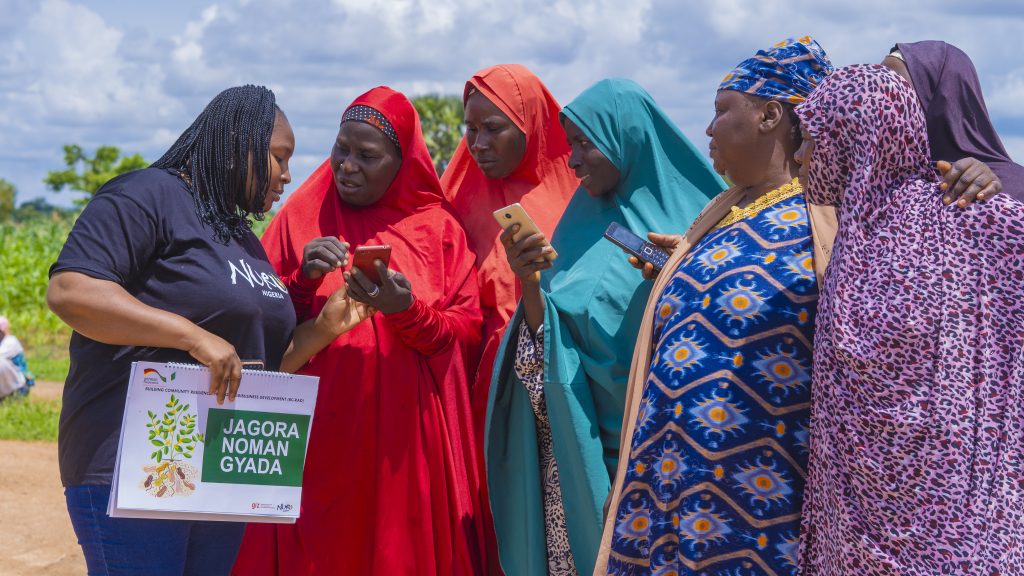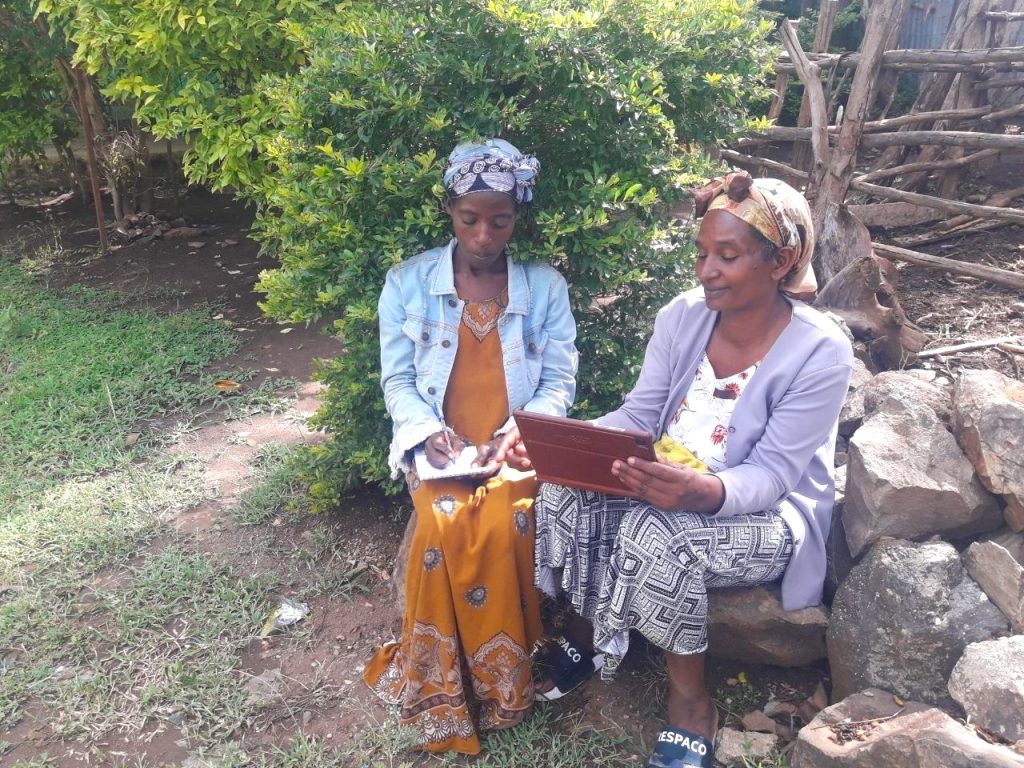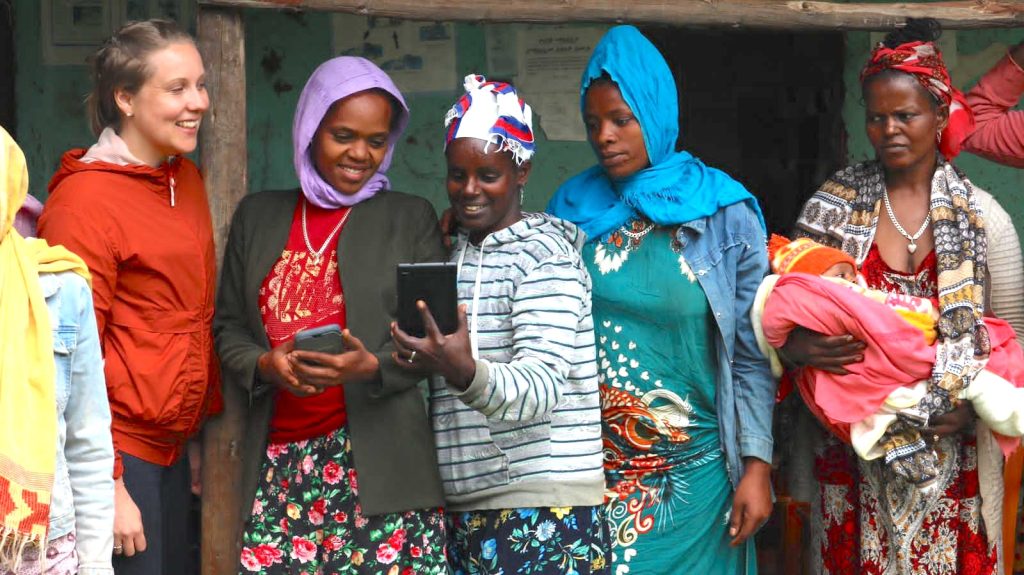Disruptive Digital Technologies And Local Leadership Build Appropriate Solutions
Nuru builds digital technology partnerships that bridge the digital divide in rural communities. By working closely with technology experts, Nuru puts disruptive digital solutions in the hands of farmers to support the meaningful choices they need to make to adapt to the impacts of climate change and build resilience.
Innovations in digital technology and the massive infrastructure expansion have facilitated access to remote communities worldwide. While technology is not without risks and weaknesses, it has increased access to information, provided learning opportunities, and enabled connections between widely dispersed groups, markets, and people. However, few proposed development approaches like Nuru’s ensure that technology reaches those most in need.
Nuru builds responsible, sustainable, and locally-owned digital foundations in highly vulnerable rural communities threatened by conflict and climate change. These rural communities have not yet been included in the rapid technological advancements that drive the global economy. The digital divide continues to grow as digital technology becomes increasingly complex. Leaving these rural communities behind is detrimental to them and the national and global economies they support.
The Nuru model bridges the digital divide for over 320,000 people in Kenya, Ethiopia, Nigeria, Burkina Faso, and Ghana through locally-led last-mile digital service delivery.
Digital Technology & Climate Change
Farming households in marginalized rural communities across Sub-Saharan (S.S.) Africa disproportionately face the greatest threats associated with climate change. Extreme temperatures and increasingly unpredictable rainfall generate significant negative impacts on livelihoods, food security, nutrition, and national economies. At Nuru, we firmly believe that mainstreaming digital technology in sustainable development requires the power of digital currencies, on-farm analytics (e.g., yield data, crop monitoring, soil sensors, etc.), remote sensing, e-learning, advanced information services on climate and markets, and many other disruptive and appropriate technologies. These digital technologies must be embedded in the business models of farmer organizations so that smallholder farmers can benefit from their power.
Nuru supports farmer households and organizations with climate-smart and nutrition-sensitive agricultural services that help them build their adaptive capacity to climate change for the whole household. In turn, Nuru supports regenerative agricultural practices and agroforestry techniques as part of nature-based solutions that can store carbon dioxide and help mitigate climate change. Nuru’s support services are dramatically enhanced through blended digital curricula, hyper-local weather forecasts, and tailored digital information on healthy behaviors. Strong digital technology partnerships enable Nuru to deliver digitally-enabled solutions that address poverty and equip farmers and their communities to adapt amid changing weather and climate-related shocks.
Ensuring Digital Disruption is Appropriate
In fifteen years, the Nuru Collective of locally-led NGOs has grown from one country to five, and from a few hundred people impacted to over 320,000. The foundation of this growth is predicated on working hand-in-hand with local leaders, farmer organizations, and rural households to co-create sustainable development solutions. This locally-led development approach allows Nuru-supported communities to chart a path toward lasting and meaningful choices unique to their own contexts. On top of this foundation, Nuru promotes the implementation of appropriate and disruptive digital technology.
All sectors need disruptive digital innovation, and sustainable development is no different. However, too often, digital technologies that intend to support rural communities fail to achieve significant adoption or viable usage. The result is communities that cannot benefit from the digital revolution (i.e., the “digital divide”) and technology businesses or products with unviable business models. Many factors widen this digital divide: inadequate infrastructure, high costs of extending networks to remote areas, limited economic resources, and lack of reliable electricity. Additionally, factors like low digital literacy, regulatory hurdles, and scarcity of local language content hinder adoption. Nuru can work closely with digital technology companies and service providers to contextualize these challenges and devise a plan of action to chart a path toward rural digital inclusion and business sustainability.
Below, you will find a few examples of these strategic digital technology partnerships:
Nuru Technology Partners
ignitia
Ignitia, a USAID partner funded through Development Innovation Ventures, offers hyper-local, highly accurate weather forecasts and agricultural advisories to farmers in the tropics via text messages. This turns the weather from an unpredictable threat into an asset by supporting climate-smart decision-making. Nuru began its partnership with ignitia in 2021 in Nigeria with a small pilot project. As of 2024, Nuru will collaborate with ignitia to deliver localized weather forecasting to over 7,000 farmers in climate change and conflict-impacted regions of Nigeria, Burkina Faso, and Ghana.

Woman leader explaining the day’s weather forecast in Nigeria
Farmers receive daily, weekly, and monthly weather forecasts specifically for their farms through ignitia’s climate intelligence services. Nuru and ignitia have also delivered advisory information via SMS text messages to farmers that leverage ignitia’s proprietary weather models. The extension messages reach simple feature phones and provide information on good agricultural practices and time-specific advice for farmers on activities such as planting and fertilizer application.
AMEA
Nuru has been an Agribusiness and Market Ecosystem Alliance (AMEA) member since 2018, engaging with both local and global chapters. AMEA is a partnership of NGOs, private sector companies, and multilateral institutions with a shared interest in accelerating the development of professional farmer organizations. Since 2019, Nuru has led AMEA’s AgTech working group, championing the appropriate application of disruptive technologies for smallholder farmers.

Agribusiness Leadership Program Training in Ethiopia
As a member of AMEA, Nuru has collaborated very closely with the International Finance Corporation (IFC), part of the World Bank Group (WBG), to test and refine its digital Agribusiness Leadership Program (ALP) through blended learning formats. The ALP curriculum prepares farmer organizations to enhance their productivity and business performance. The ALP is now available on Microsoft Community Training (MCT) desktops, tablets, and smartphones using multiple formats, such as videos, animations, infographics, quizzes, and templates. This is an example of a partnership that has benefited Nuru-supported farmer organizations, but also tens of thousands more people that the IFC and its clients support.
Health [e] Foundation & LUCY app
Health [e] Foundation (HeF) developed the LUCY app to address the challenges faced by pregnant women and mothers of newborns with either limited or no access to information about their pregnancy or the first year of their baby’s life. This lack of information can lead to serious and preventable health complications. Nuru is actively collaborating with HeF to deliver the LUCY app to rural women and mothers in Ethiopia. The app provides a knowledge-enriching approach for health extension workers in Ethiopia, reducing pressure on an overburdened health system while ensuring rural households have access to life-saving information in the face of growing environmental, social, and economic pressures.

LUCY app training (photo credit: Health[e] Foundation)
LUCY is a free smartphone app for pregnant women and parents of newborns, and it contains a personalized calendar of all antenatal and postnatal care visits, and vaccinations for the newborn. The app aims to reduce maternal and neonatal morbidity and mortality by supporting women and parents to make informed decisions about their own health and the health of their babies. The app provides information about fetal development, potential health risks, healthy behavior/nutrition, birth preparedness, family planning, and vaccines.
The Future of Technology for the Nuru Collective
The Nuru Collective shares a vision for cultivating lasting, meaningful choices in the world’s most vulnerable and marginalized communities. Nuru locally-led NGOs are world-class, nationally registered implementing partners currently operating across Kenya, Ethiopia, Nigeria, Burkina Faso, and Ghana in 2024. Nuru is positioned to scale to new regions within each country and new countries across West Africa and Central America by 2030.
The Nuru model is a locally-led, digitally enabled, climate-resilient approach to last-mile sustainable development for rural communities. We are actively looking for new digital technology partners to help us achieve this mission and bring lasting, meaningful choices to the smallholder farming communities that need them the most.
Are you a digital services provider interested in working in East Africa, West Africa, or Central America? Please contact us at info@nuruinternational.org.


